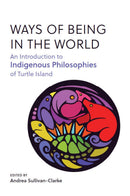Description
Andrea Sullivan-Clarke, Muskogee Nation of Oklahoma, has edited this collection.
Ways of Being in the World is an anthology of the Indigenous philosophical thought of communities across Turtle Island, offering readings on a variety of topics spanning many times and geographic locations. It was created especially to meet the needs of instructors who want to add Indigenous philosophy to their courses but are unsure where to begin—as well as for students, Indigenous or otherwise, who wish to broaden their horizons with materials not found in the typical philosophy course. This collection is an invitation to embark on a relationship with Indigenous peoples through the introduction of their unique philosophies.
Table of Contents:
Acknowledgements
Preface
Introduction
Beginning the Right Way
What’s in a Name?
How to Use This Book
Cokv Kerretv Heret Os
Part I: The Indigenous Philosophies of Turtle Island
Introduction
1.1 Vine Deloria Jr. (Standing Rock Sioux) and Daniel R. Wildcat (Yuchi member of the Muscogee Nation of Oklahoma) Power and Place: Indian Education in America, Chapter 3, “Power and Place Equal Personality”
1.2 Donald L. Fixico (Shawnee, Sac and Fox, Muscogee, Seminole) The American Indian Mind in a Linear World, Chapter 3, “American Indian Circular Philosophy”
1.3 Alejandro Santana (Mexican American) “Did the Aztecs Do Philosophy?”
Part II: Philosophy of Religion
Introduction
2.1 Assorted Responses to Christianity: Speeches and Letters
2.1 a 1567 Letter of Francisco de Montejo Xiu
2.1 b SHAKÓYE:WA:THAˀ, Red Jacket (Seneca) 1805 Speech on Religion
2.1 c Ma-chú-nu-zhe, Standing Bear (Ponca) 1879 Landmark Civil Rights Case Testimony.
2.2 Vine Deloria Jr. (Standing Rock Sioux) God Is Red, Chapter 5, “The Problem of Creation”
2.3 Winona LaDuke (Ojibwe) “In the Time of the Sacred Places” (excerpt)
Part III: Metaphysics
Introduction
3.1 Viola Cordova (Jicarilla Apache) How It Is, “Coda: Living in a Sacred Universe”
3.2 Robin Wall Kimmerer (Citizen Potawatomi Nation) Braiding Sweetgrass, “Skywoman Falling”
3.3 Hilary N. Weaver (Lakota) “Indigenous Identity: What Is It, and Who Really Has It?”
3.4 Leanne Betasamosake Simpson (Michi Saagiig Nishnaabeg) As We Have Always Done, “Endlessly Creating Our Indigenous Selves”
3.5 Kurtis Boyer (Métis) “Where Does Agency Come From? Exploring Indigenous Models of Mind”
Part IV: Epistemology
Introduction
4.1 Kyle Powys Whyte (Citizen Potawatomi Nation) “On the Role of Traditional Ecological Knowledge as a Collaborative Concept: A Philosophical Study”
4.2 Joel Alvarez (Puerto Rican, Ecuadorian) “Native American Epistemology through Dreams”
4.3 Paul Simard Smith (Métis) “The Epistemology of Deep Disagreement and Indigenous Oral Histories”
Part V: Ethics
Introduction
5.1 Joseph Len Miller (Muscogee) “What Do We Need to Know to Live in Harmony with Our Surroundings?”
5.2 Jo-Ann Archibald, Q’um Q’um Xiiem (Stó:lō/Soowahlie First Nation) “Indigenous Storytelling”
5.3 Peter Irniq, Piita Taqtu Irniq (Inuit) “Healthy Community”
Closing
Permissions Acknowledgements
About the Editor
About the Artist
Ways of Being in the World is an anthology of the Indigenous philosophical thought of communities across Turtle Island, offering readings on a variety of topics spanning many times and geographic locations. It was created especially to meet the needs of instructors who want to add Indigenous philosophy to their courses but are unsure where to begin—as well as for students, Indigenous or otherwise, who wish to broaden their horizons with materials not found in the typical philosophy course. This collection is an invitation to embark on a relationship with Indigenous peoples through the introduction of their unique philosophies.
Table of Contents:
Acknowledgements
Preface
Introduction
Beginning the Right Way
What’s in a Name?
How to Use This Book
Cokv Kerretv Heret Os
Part I: The Indigenous Philosophies of Turtle Island
Introduction
1.1 Vine Deloria Jr. (Standing Rock Sioux) and Daniel R. Wildcat (Yuchi member of the Muscogee Nation of Oklahoma) Power and Place: Indian Education in America, Chapter 3, “Power and Place Equal Personality”
1.2 Donald L. Fixico (Shawnee, Sac and Fox, Muscogee, Seminole) The American Indian Mind in a Linear World, Chapter 3, “American Indian Circular Philosophy”
1.3 Alejandro Santana (Mexican American) “Did the Aztecs Do Philosophy?”
Part II: Philosophy of Religion
Introduction
2.1 Assorted Responses to Christianity: Speeches and Letters
2.1 a 1567 Letter of Francisco de Montejo Xiu
2.1 b SHAKÓYE:WA:THAˀ, Red Jacket (Seneca) 1805 Speech on Religion
2.1 c Ma-chú-nu-zhe, Standing Bear (Ponca) 1879 Landmark Civil Rights Case Testimony.
2.2 Vine Deloria Jr. (Standing Rock Sioux) God Is Red, Chapter 5, “The Problem of Creation”
2.3 Winona LaDuke (Ojibwe) “In the Time of the Sacred Places” (excerpt)
Part III: Metaphysics
Introduction
3.1 Viola Cordova (Jicarilla Apache) How It Is, “Coda: Living in a Sacred Universe”
3.2 Robin Wall Kimmerer (Citizen Potawatomi Nation) Braiding Sweetgrass, “Skywoman Falling”
3.3 Hilary N. Weaver (Lakota) “Indigenous Identity: What Is It, and Who Really Has It?”
3.4 Leanne Betasamosake Simpson (Michi Saagiig Nishnaabeg) As We Have Always Done, “Endlessly Creating Our Indigenous Selves”
3.5 Kurtis Boyer (Métis) “Where Does Agency Come From? Exploring Indigenous Models of Mind”
Part IV: Epistemology
Introduction
4.1 Kyle Powys Whyte (Citizen Potawatomi Nation) “On the Role of Traditional Ecological Knowledge as a Collaborative Concept: A Philosophical Study”
4.2 Joel Alvarez (Puerto Rican, Ecuadorian) “Native American Epistemology through Dreams”
4.3 Paul Simard Smith (Métis) “The Epistemology of Deep Disagreement and Indigenous Oral Histories”
Part V: Ethics
Introduction
5.1 Joseph Len Miller (Muscogee) “What Do We Need to Know to Live in Harmony with Our Surroundings?”
5.2 Jo-Ann Archibald, Q’um Q’um Xiiem (Stó:lō/Soowahlie First Nation) “Indigenous Storytelling”
5.3 Peter Irniq, Piita Taqtu Irniq (Inuit) “Healthy Community”
Closing
Permissions Acknowledgements
About the Editor
About the Artist


